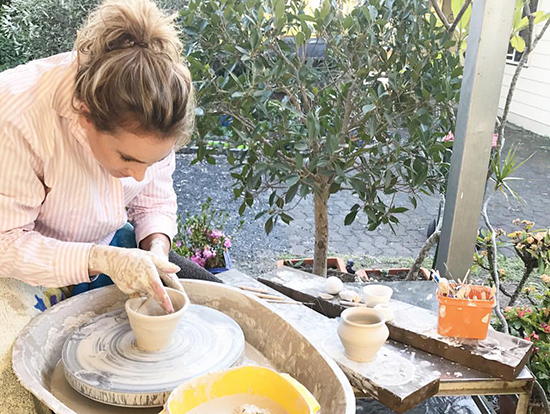A conversation about promoting local economic development based on tourism and traditional handicrafts took place on October 16th between Japanese experts and Quang Nam’s artisans.

Bree Dawn is making a pottery products in Thanh Ha village
The event was under the Japan- funded project on the development of sales channels through the linkage between tourism and local products, expansion of safe vegetable production and development of traditional handicrafts.
Markets for handicrafts
It would be hard to find Quang Nam’s specialties in developed tourism areas if there were not special distribution channels. Currently, there are 2 JICA-supported stalls displaying Quang Nam’s handicraft products and agricultural products in Hoi An, and a store for fresh vegetables from Hung My (Binh Trieu commune, Thang Binh district) in Da Nang city. Mr. Fumio Kato from JICA (Japanese International Co-operation Agency) said that most of Quang Nam's specialties have not gained access to modern distribution methods and channels to domestic and foreign markets.
In addition, the role of trade promotion organizations in Quang Nam is rather fuzzy, so the systematic linkage between the quality, designs and sales of local products faces a lot of difficulties. Just a few local specialties are under trademark registration and protection. Besides, the stage of product development has not been paid much attention, which leads to low competitiveness. Some local typical products are gradually being lost.
According to Director of the Japan Institute for Product Development Hamada Haruko, local economic development through sustainable tourism is creating opportunities for handicrafts. Sustainable tourism creates a comfortable environment, promoting available values, helping increase local businesses.
Core values from the locals
Identifying the problems in Quang Nam rural areas, JICA has developed the sales channels through the linkage between local products and tourism. The development of traditional handicraft products here was sponsored by Minamiboso City (Chiba Prefecture, Japan) in 2016. The designs of the local products have been rebuilt. Some shops have been renovated. Artisans’ skills have been improved. As a result, the local products have been consumed, which helps develop the locals’ livelihood. Moreover, the project has facilitated the local artisans’ exchange and mutual helps. Mr. Fumio Kato believed that the core value of local development lied in the protection of the locals, cultural space and community characters.
Thanks to JICA-funded projects, the local people's awareness has increased significantly; the market for agricultural products has been expanding; the locals’ income has gone up.
The link between the traditional craft villages and sustainable tourism is a long journey, starting at the locals’ awareness through JICA projects.